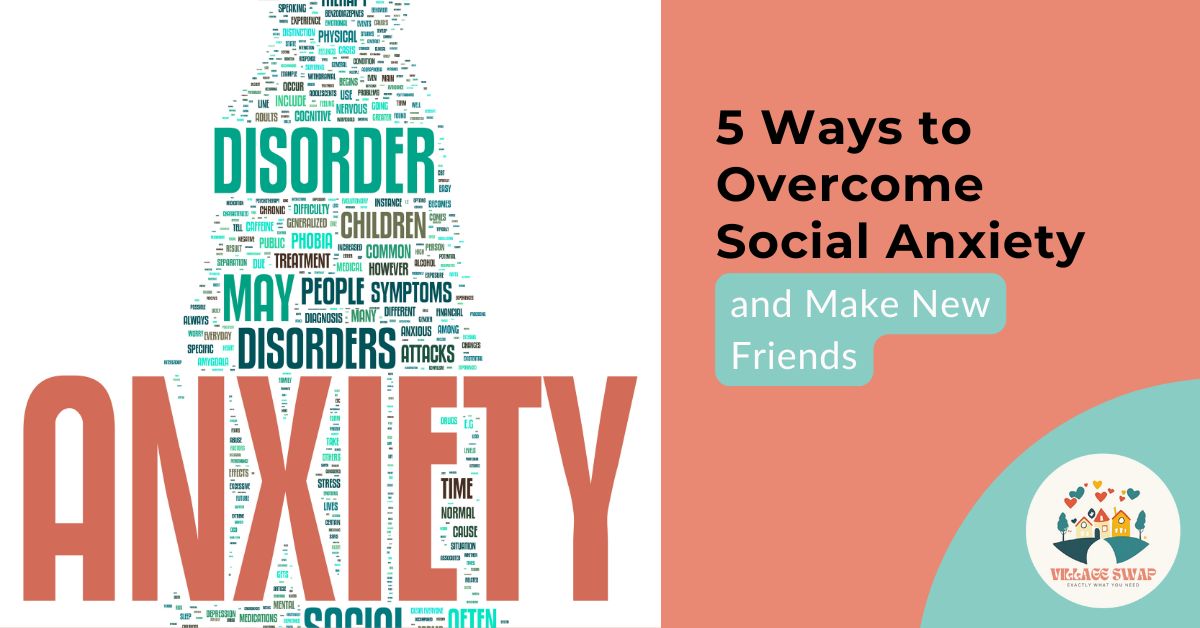5 Ways to Overcome Social Anxiety and Make New Friends

5 Ways to Overcome Social Anxiety and Make New Friends
You know that feeling — you want to go. You want to meet new people, join the group, have a laugh, and finally feel that sense of belonging you've been craving.
But there’s this invisible wall made of sweaty palms, racing heartbeats, and every worst-case scenario your brain can cook up.
First of all: you’re not broken.
You’re human.
And if you're battling social anxiety but still dreaming of real-life friendships, you’re actually incredibly brave.
At Village Swap, a lot of people have told me they want to come to Games Day, but they're terrified. And I get it. I really do.
That’s why I offered to meet people in the car park and walk them in — because sometimes you just need someone to stand beside you when the fear feels bigger than you.
But what if you could give yourself a few more tools for your back pocket too?
Here are five research-backed ways to push through anxiety when the reward — real connection — is absolutely worth it.
1. Name It to Tame It
One of the simplest but most powerful tools? Call it out.
Research from UCLA’s Department of Psychology shows that when we label our feelings ("I’m anxious right now," "I’m scared but excited"), the emotional part of our brain (the amygdala) actually quiets down.¹
It’s like shining a torch into a dark room — suddenly, the monster under the bed is just a pile of laundry.
Try this:
Before the event, or even sitting in your car, say it out loud:
"I'm feeling anxious because I care. I’m stepping into something good, and my body’s just scared of the unknown. That’s normal."
2. Shrink the Story
Anxiety loves drama.
Left unchecked, it’ll have you convinced that walking into a room alone is the same as facing a firing squad.
Cognitive Behavioural Therapy (CBT) — which is basically the gold standard for anxiety treatment — teaches that challenging your internal story can shrink fear down to size.²
Ask yourself:
-
What's the worst thing that could happen?
-
What's the best thing that could happen?
-
What's the most likely thing that will happen?
Spoiler alert: the most likely thing is that you'll meet some nice people who are just as nervous as you are.
3. Borrow Some Courage (aka, Body Hack It)
You don't have to feel confident to act confident.
Harvard psychologist Amy Cuddy found that just two minutes of a “power pose” (standing tall, shoulders back, feet firmly planted) can lower cortisol (your stress hormone) and boost feelings of bravery.³
Try this:
Before you leave the house or hop out of the car, stand tall like you're the bloody Prime Minister about to enter Parliament. Breathe deep. Hold it for two minutes. Walk in like you own the place (even if you feel like a nervous meerkat inside).
4. Have a Micro-Plan
Sometimes the idea of an entire event feels overwhelming.
Break it down smaller. Like, way smaller.
Peer-reviewed research shows that when we set specific, small goals, anxiety drops and motivation goes up.⁴
Instead of “I have to make new best friends today”, make it:
-
“I’ll say hi to one person.”
-
“I’ll stay for 20 minutes and see how I feel.”
-
“I’ll grab a drink, take a breath, and people-watch if I need a minute.”
You don’t have to do everything perfectly. You just have to show up for yourself, one tiny step at a time.
5. Reframe the Butterflies
You know that thumping heart, sweaty hands, slightly jittery feeling?
It’s almost the same physical reaction you get when you're excited.
Stanford research by Dr. Alia Crum found that when people reframed anxiety symptoms as signs they were gearing up for something important, not dangerous, they performed better and felt calmer.⁵
Next time you feel the butterflies?
Tell yourself: "This is my body getting ready for something good."
It’s not a warning. It’s a warm-up.
A Final Word
If you’re scared to come to an event like Village Games Day — you're not alone.
Every single person walking through those doors has a little voice in their head whispering, “Will I fit in?”
(And honestly? That voice never goes away entirely. It just gets quieter when you realise you're not the only one hearing it.)
Real connection is worth the risk.
Even if your hands are shaking. Even if your voice wobbles when you say hello.
Even if you sit in your car for ten minutes psyching yourself up.
Courage isn't the absence of fear. It's deciding that the thing you want is bigger than the thing you're scared of.
I'll be right there in the car park if you need me.
And so will a whole village of people who get it.
References:
¹ Lieberman, M. D. et al. (2007). Putting feelings into words: Affect labeling disrupts amygdala activity in response to affective stimuli. Psychological Science.
² Hofmann, S. G. et al. (2012). The efficacy of cognitive behavioral therapy: A review of meta-analyses. Cognitive Therapy and Research.
³ Cuddy, A. J. et al. (2012). Power posing: Brief nonverbal displays affect neuroendocrine levels and risk tolerance. Psychological Science.
⁴ Locke, E. A., & Latham, G. P. (2002). Building a practically useful theory of goal setting and task motivation. American Psychologist.
⁵ Crum, A. J. et al. (2013). Rethinking stress: The role of mindsets in determining the stress response. Journal of Personality and Social Psychology.
